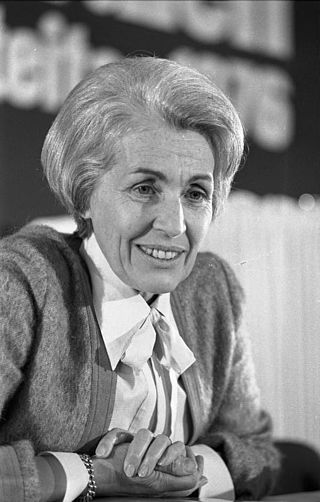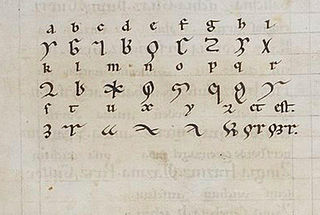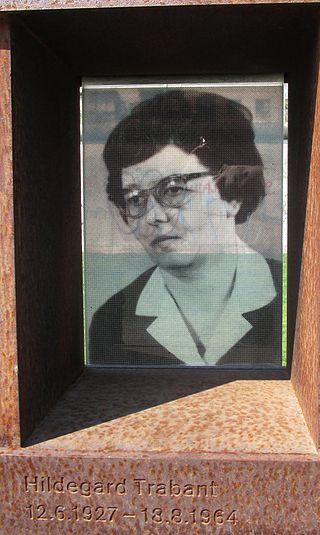Related Research Articles

Hildegard of Bingen, also known as Saint Hildegard and the Sibyl of the Rhine, was a German Benedictine abbess and polymath active as a writer, composer, philosopher, mystic, visionary, and as a medical writer and practitioner during the High Middle Ages. She is one of the best-known composers of sacred monophony, as well as the most recorded in modern history. She has been considered by a number of scholars to be the founder of scientific natural history in Germany.

Hildegard Frieda Albertine Knef was a German actress, singer, and writer. She was billed in some English-language films as Hildegard Neff or Hildegarde Neff.

Hildegard was a Frankish queen and the wife of Charlemagne from c. 771 until her death. Hildegard was a noblewoman of Frankish and Alemannian heritage. Through eleven years of marriage with Charlemagne, Hildegard helped share in his rule as well as having nine children with him, including the kings Charles the Younger and Pepin of Italy and the emperor Louis the Pious.

Hildegard Hamm-Brücher was a liberal politician in Germany. She held federal state secretary positions from 1969 to 1972 and from 1977 to 1982. She was the Free Democratic Party's candidate in the first two rounds of the federal presidency elections in 1994.

A lingua ignota was described by the 12th-century abbess Hildegard of Bingen, who apparently used it for mystical purposes. It consists of vocabulary with no known grammar; the only known text is individual words embedded in Latin. To write it, Hildegard used an alphabet of 23 letters denominated litterae ignotae.

Hildegard Behrens was a German operatic soprano with a wide repertoire including Wagner, Weber, Mozart, Richard Strauss, and Alban Berg roles. She performed at major opera houses around the world, and received several Grammy Awards for performances with the Metropolitan Opera.

Eibingen Abbey is a community of Benedictine nuns in Eibingen near Rüdesheim in Hesse, Germany. Founded by Hildegard of Bingen in 1165, it was dissolved in 1804, but restored, with new buildings, in 1904. The nuns produce wine and crafts. They sing regular services, which have been at times recorded. The church is also used as a concert venue. The abbey is a Rhine Gorge World Heritage Site.
Ordo Virtutum is an allegorical morality play, or sacred music drama, by Hildegard of Bingen, composed around 1151, during the construction and relocation of her Abbey at Rupertsberg. It is the earliest morality play by more than a century, and the only medieval musical drama to survive with an attribution for both text and music.

Hildegard Falck is a retired West German runner. At the 1972 Olympics she won a gold medal in the 800 m and a bronze medal in the 4 × 400 m relay with West German team. In the 800 m final she finished 0.1 seconds ahead of Nijolė Sabaitė and Gunhild Hoffmeister.

Hildegard Körner is a retired East German middle distance runner who specialized in the 800 metres.

Princess Hildegard of Bavaria was the seventh child and fourth daughter of Ludwig I of Bavaria and Therese of Saxe-Hildburghausen.
Hans Eller was a German rower who competed in the 1932 Summer Olympics in Los Angeles, USA. In 1932 he won the gold medal as member of the German boat in the coxed fours competition.
Hildegard Goss-Mayr is an Austrian nonviolent activist and Christian theologian.

Scivias is an illustrated work by Hildegard von Bingen, completed in 1151 or 1152, describing 26 religious visions she experienced. It is the first of three works that she wrote describing her visions, the others being Liber vitae meritorum and De operatione Dei. The title comes from the Latin phrase Sci vias Domini. The book is illustrated by 35 miniature illustrations, more than that are included in her two later books of visions.

Hildegard Katarina Thorell, née Bergendal, 22 May 1850 – 2 February 1930, was a Swedish painter.

Hildegard Johanna Maria Trabant was an East German woman who became the fiftieth known person to die at the Berlin Wall. Trabant was shot and killed by East German border guards during a crossing attempt, one of only eight women victims of the Berlin Wall, and was the only escapee victim known to have a record of loyalty toward the East German regime.

Clementia Killewald OSB was a German Benedictine nun at Eibingen Abbey. She served first as an organist, then took care of the elderly and sick, and finally from 2000 she served as abbess. She introduced the life and work of Saint Hildegard of Bingen, the founder of the abbeys of Rupertsberg and Eibingen, during the 2012 ceremony when Pope Benedict XVI proclaimed Hildegard a Doctor of the Church.
Hildegard Grill is an Austrian gymnast. She competed in seven events at the 1952 Summer Olympics.
Josef Humplik was an Austrian sculptor. His work was part of the sculpture event in the art competition at the 1936 Summer Olympics.
Bardcore or tavernwave is a musical microgenre that became popular in 2020, consisting of medieval-inspired remakes of popular songs.
References
- ↑ "Hildegard Appeltauer". Olympedia. Retrieved 2 July 2020.